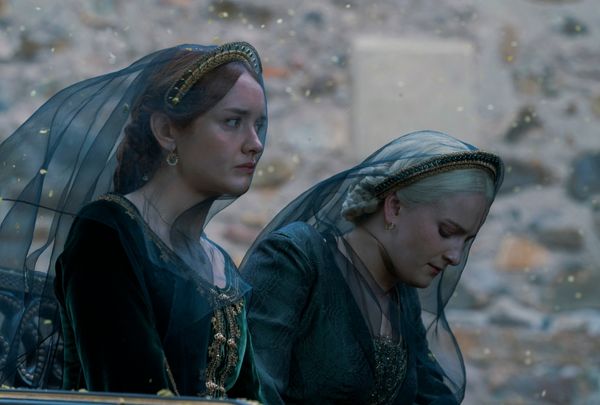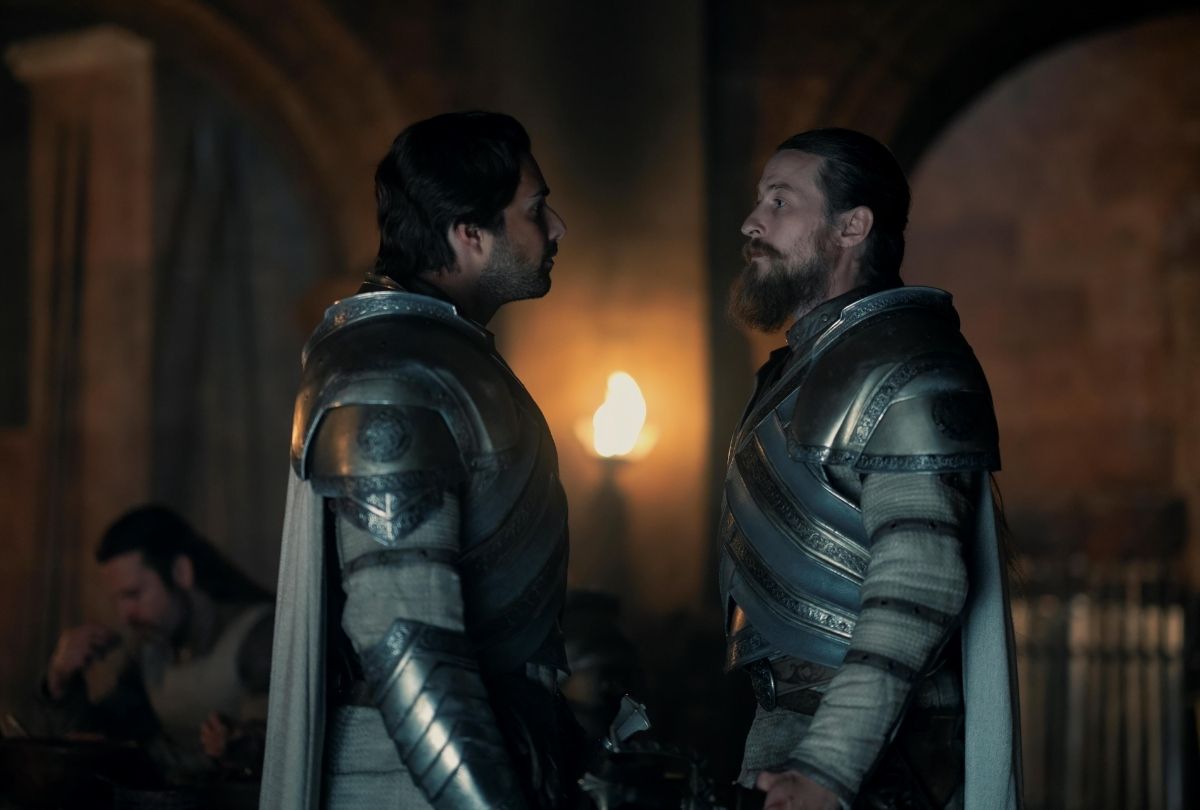“House of the Dragon” sets the tone for its second season by closing its first episode with an assassination. “A son for a son,” as the terms are described, and the premiere is titled. Daemon Targaryen (Matt Smith) gives the order to a Gold Cloak in King's Landing who remains loyal to him and Rhaenyra Targaryen (Emma D'Arcy) – but mainly to Daemon, who is a doer and not a thinker.
Daemon tells the soldier to kill his nephew Aemond (Ewan Mitchell) as payback for Aemond murdering Rhaenyra’s son Luke. But to the brute and the rat catcher he employs to guide him through the palace to the royal quarters, any prince will do – and so the two murder and behead the young heir to the throne in his tiny bed. We don’t see the gruesome deed, only hear a small yelp and the awful, horrid sound of a blade sawing through flesh. The idea of it is horrifying enough.
But that approach only works to a point. The second episode begins with Aegon II (Tom Glynn-Carney) raging at his son’s murder and his mother Alicent (Olivia Cooke) curbing the urge to ugly cry at the loss of “the child.”
This is how the decapitated boy is called by those discussing his fate, except when Aegon calls him his son, his heir. “My son is my legacy!” Aegon screams, and that’s true. But the kid had a name. Didn't he?
A full nine minutes and 45 seconds pass, along with lengthy discussions about what is to be done about the murder of “the child,” before the king’s Hand, Otto Hightower (Rhys Ifans) finally says, “Jaehaerys was my grandson. I loved him. I will not have him die in vain.”
Ah, yes. Jaehaerys. That’s what he was called.
Some of you may read a bit of codger’s crankiness into any griping over an inability to remember who is called what in this series. Any unsteady hold on the who’s who of the Targaryen age didn’t stop 7.8 million viewers from watching the second season debut – a drop from the series premiere, but still impressive.
As I previously pointed out, if you’re still with “House of the Dragon” then you’re in it for the dragons. Otherwise, we only need to identify with D’Arcy's, Cooke's and Smith’s characters. Eve Best’s Queen That Never Was, Rhaenys, never fails to make an impression, that's true. And maybe we’ve noticed Fabien Frankel’s DTF Ser Criston Cole and Mitchell’s Aemond, who is basically Daemon except younger and bitterer.
Death guarantees something will happen each hour that we don't get a dragon battle.
Everyone else is expendable in that view. We already know how this ends, especially if you’ve read George R.R. Martin’s “Fire & Blood” which, based on a level of character development we’ll generously call breezy, the writers must be assuming the audience has.
But when a dead Boy King That Never Will Be isn’t named even by those closest to him, that explains what death is in this story – a propulsive device, and little else. We didn’t know Luke either. But Luke’s death begets Jaehaerys’ which leads to two more at the end of the second episode that were senseless and designed not to make any sense.
Death guarantees something will happen each hour that we don't get a dragon battle, although more thoughtful exposition devoted to political engineering would be preferable. That worked wonders in “Game of Thrones," ensuring we'd remember so many names. Valar Morghulis means "All men must die" in High Valyrian, the language of the Targaryens. True enough, but can't the writers share a few of their distinct traits and behaviors before that happens?
In King’s Landing, the traitorous Gold Cloak that murdered the royal boy was caught and confessed but couldn’t identify the rat catcher who assisted him. So Aegon in his rashness hangs all the castle’s rat catchers and displays their bodies on the walls by the gate. The horrendous sight moves a woman to gaze upward at one of the unfortunates and wanly say, “Oh no. My son.”
 Olivia Cooke as Alicent Targaryen and Phia Saban as Helaena Targaryen in "House of the Dragon" (HBO) (HBO)War looms closer in the second episode thanks to Daemon’s blunder. Otto Hightower persuades Aegon to allow his child’s body to be paraded through the streets with his head sewn back on, and Alicent and his mother Helaena (Phia Saban) sitting quietly behind him. A crier walks with them, announcing the boy’s death as Rhaenyra’s work, which wins the Greens the people’s sympathy . . .
Olivia Cooke as Alicent Targaryen and Phia Saban as Helaena Targaryen in "House of the Dragon" (HBO) (HBO)War looms closer in the second episode thanks to Daemon’s blunder. Otto Hightower persuades Aegon to allow his child’s body to be paraded through the streets with his head sewn back on, and Alicent and his mother Helaena (Phia Saban) sitting quietly behind him. A crier walks with them, announcing the boy’s death as Rhaenyra’s work, which wins the Greens the people’s sympathy . . .
. . . until Aegon hangs a slew of other mothers' innocent sons. Death can be a potent display of political might. Until it isn’t.
We need your help to stay independent
On Dragonstone, Rhaenyra and her small council are desperate to figure out how to recover from this P.R. nightmare. With the great houses wavering in their support, being branded a child murderer is the last thing she needs. But the campaign to restore her image is backburnered when she realizes Daemon ordered the hit.
This finally reveals what’s been eating at Rhaenyra. She accuses Daemon, correctly, of not marrying her out of love but to get close to the throne. Daemon barely denies it, but admits he never respected her father. Then, before he exits to parts unknown, Daemon spitefully tells her that Viserys’ naming of Rhaenyra as his heir was not a testament to her capability but a means of getting back at him. This is not what a girl wants her loving uncle-husband to say to her in her darkest hour!
The road to war can’t become a funeral cart stuck in a pothole before the massive destruction begins. Some action must urge the story onward, which is where the tragedy of Ser Erryk Cargyll (Elliott Tittensor) and Ser Arryk Cargyll (Luke Tittensor) enters.
The Tittensors don’t play the only twins in the court; the Lannisters have a pair in Jason and Ser Tyland (both played by Jefferson Hall). But the Cargylls were written to be doomed figures whose purpose is primarily metaphoric: Two knights not simply from the same family but who shared a womb, divided by the royal family’s rift. For that you need two actors who probably should have been utilized more extensively before now.
"All men must die," but can't the writers share a few of their distinct traits and behaviors before that happens?
Erryk and Arryk each took an oath to serve King Viserys, but could not agree on the politically suspicious interpretation of his will after he died, so Erryk pledged his loyalty to Rhaenyra, as Viserys decreed.
Woe unto Arryk, then, for being a convenient patsy when Aegon tears into Criston Cole for his failure to prevent his son’s death. Criston was boning Aegon’s mom, so that’s not a good look. It’s also shameful – and in his guilt, he turns on Arryk, blaming him for allowing a killer to get past him even though Arryk was with Aegon, at his command.
To restore the Kingsguard’s honor, Criston orders Arryk to infiltrate Dragonstone and, posing as Erryk, kill Rhaenyra.
He would have gotten away with it too if Rhaenyra hadn’t agreed to free Daemon’s jilted and jailed lover Mysaria (Sonoya Mizuno), who recognizes Arryk approaching the castle from a boat. She warns Erryk, who confronts his twin in time to stop him from slicing Rhaenyra open in her bedchamber.
This culminates in a battle where no one can tell who is who – not Rhaenyra, not the captain of the guard who comes in to help and probably not the audience. (Except, maybe, for mothers of twins?) Like the realm itself, brother attacks brother with blades until Erryk kills Arryk and then, in his sorrow, falls on his own sword.
I think that’s how it went down.
Want a daily wrap-up of all the news and commentary Salon has to offer? Subscribe to our morning newsletter, Crash Course.
A heartbreaking scene that would have been doubly so if the Tittensors had been granted any hint of interiority to individualize them beyond their duties. When differentiating between two knights comes down to a vowel, there isn’t much one can wring from their demise.
The Targaryens’ downfall, according to “House of the Dragon,” erupts as a matter of confusion. In Season 1 Viserys shares with a young Rhaenyra the secret of the blade the king carries by telling her of Aegon I’s prophecy of the Song of Ice and Fire and the Prince That Was Promised. This secret handshake equivalent was never passed to his son Aegon II, who was named after the greater Aegon. But since Viserys dropped that name in his dying words and failed to specify who he was talking about, Alicent interprets the deathbed reference to mean he selected their son.
The petulant Aegon tries to remind Otto Hightower of that when the elder chastises him for hanging innocent men by snarling that Viserys was right about him.
“He made me king,” Aegon says, which makes Otto laugh and respond, “Is that what you think?”
The old man knows better. And that’s probably why his grandson fires him as his Hand and awards those duties to the entirely unsuitable Criston Cole. The King’s new advisor celebrates by waiting for Alicent in her bed chamber and allowing her to slap him around before they have grief sex. We know that's how these two relate to each other, which doesn't necessarily make them more likable. Instead it makes them more real, giving us something to miss when the inevitable comes for one or both of them. Some day.
New episodes of "House of the Dragon" premiere at 9 p.m. Sundays on HBO and on Max.



Shares